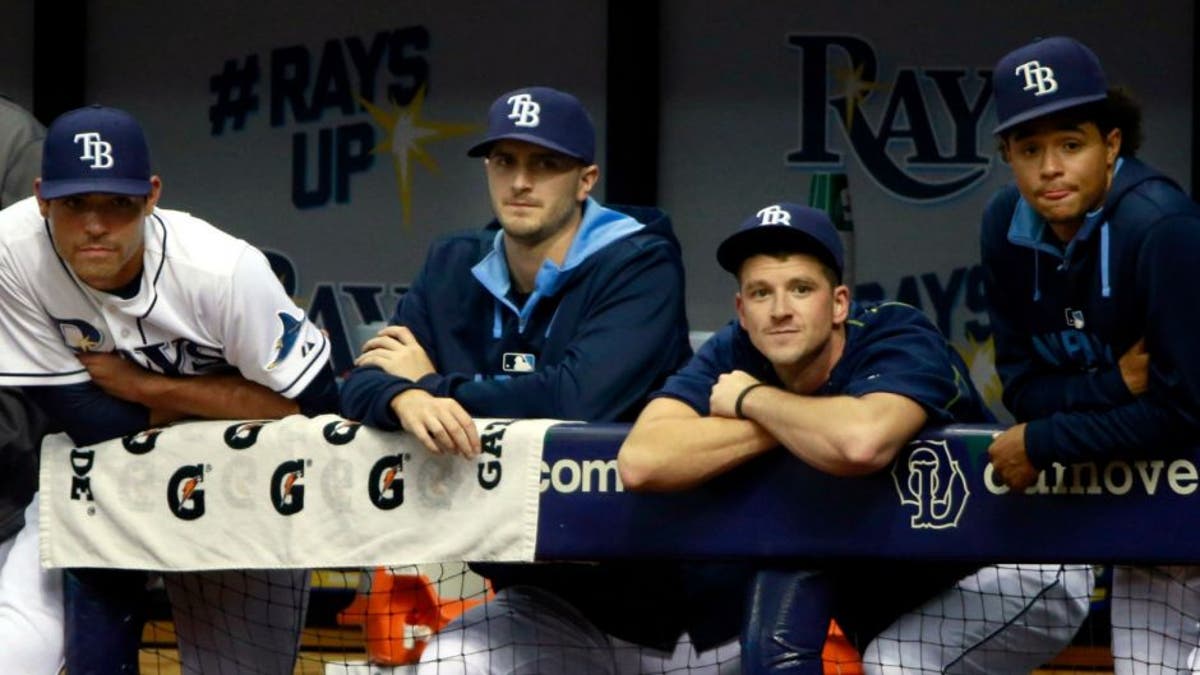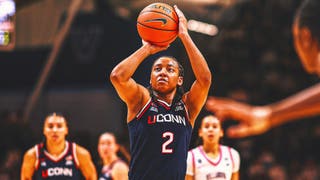
Jun 30, 2015; St. Petersburg, FL, USA; Tampa Bay Rays starting pitcher Alex Cobb (53), pitcher Matt Moore (55), pitcher Jake Odorizzi (23), pitcher Drew Smyly (33) and pitcher Chris Archer (22) look on from the dugout during the second inning against the Cleveland Indians at Tropicana Field. Mandatory Credit: Kim Klement-USA TODAY Sports
Some quick notes on the trade market:
*The Rangers are not optimistic that they will acquire one of the Rays' starting pitchers, according to a source with knowledge of the discussions.
The teams are struggling to match up on a deal, and the reason could be the Rangers' reluctance to part with a top youngster such as Jurickson Profar for a modestly accomplished pitcher such as Rays left-hander Matt Moore or right-hander Jake Odorizzi.
The Rangers remain more likely to keep Profar, 23, than move him, unless they could package him in a deal for a top starter such as the White Sox's Chris Sale or Rays' Chris Archer.
Profar, in the view of club officials, would fit even on next year's club -- he has played all four infield positions this season and recently began working in the outfield. The team also values his plate discipline in a lineup full of free-swinging power hitters; Profar's 4.28 pitches per plate appearance easily would lead the club if he had enough plate appearances to qualify.
The Rays, who would want Profar to fill their longstanding hole at shortstop, obviously could improve their offer beyond Moore or Odorizzi to land him, likely by including a reliever.
*The non-waiver deadline is still 10 days away, and one executive says there is no motivation for a seller such as the Rays to move quickly unless a team overpays. By waiting, a seller could land an extra player in a deal, or gain from a new team jumping into the market.
The Rays, for example, could benefit from the zero-sum game between the Astros and Rangers in the AL West; both teams are eyeing the few controllable starters that are available. A deal to a non-contender also is possible; the Rays are drawing interest in their starters from teams that are not currently competitive, but expect to be over the next three years, sources say.
The other option for a team such as the Rays is to wait until the offseason, when their starters still will be in demand due to the weakness of the free-agent market. Moore and Archer are signed to exceedingly club-friendly deals, Moore through 2019, Archer through '21. Odorizzi is eligible for arbitration for the first time this offseason.
*Another factor in the deadline calculus: The possibility of higher luxury-tax rates in the new collective-bargaining agreement could make players signed to below-market deals even more valuable.
If high-revenue clubs pay stiffer penalties for exceeding the luxury-tax threshold, it would significantly add to the cost of those teams signing free agents -- assuming, of course, the current system remains in place, which is likely.
Clubs are operating blindly, not knowing what the specifics of a new CBA might be. But suffice it to say that lower-cost players will remain at a premium under virtually any new economic structure.
The current CBA expires Dec. 1.
*One rival executive reasons that the Dodgers, given the uncertainty surrounding left-hander Clayton Kershaw, have almost no choice but to overpay for a controllable starter such as Archer or Sale
Think about it: The Dodgers already have spent about $250 million on this year's club. Their rotation is a hodgepodge of uncertainty. The addition of another top starter would give them a puncher's chance this season and make them that much stronger next season, when their rotation would include the new pitcher, plus Kershaw and left-hander Julio Urias.
The Rangers followed a similar thought process when they added left-hander Cole Hamels at last year's deadline; they were a sub-.500 team at that point, but knew they could at least pair Hamels with right-hander Yu Darvish this season. As it turned out, they won the AL West.
Obviously, acquiring a pitcher such as Archer or Sale would be easier said than done. An Archer deal would be complicated by his uneven 2016 performance; the Rays still would place high value on him, citing his recent improvement and his five additional years of control. The price for Sale, who is more accomplished than Archer and under control through '19, likely would be even higher.
*The Cubs' interest in Athletics outfielder Josh Reddick, as first reported by MLB Network's Jon Morosi, appears to be a stretch to be at first glance. But the Cubs have been seeking to bolster their lineup against right-handed pitching ever since losing Kyle Schwarber, and Reddick certainly could help in that regard.
The question is whether the Cubs would be the high bidder for Reddick when they also are trying to obtain an impact left-handed reliever; the Athletics at minimum want to beat the value of the draft pick they would receive if they made Reddick a qualifying offer.
Then again, the market is so thin on quality talent, teams might simply decide to upgrade wherever possible, regardless of need. If the Cubs, for example, cannot get the Yankees' Andrew Miller or Aroldis Chapman, perhaps they would settle for a lesser reliever and obtain a hitter such as Reddick, who would be an improvement over the currently injured Chris Coghlan.
*The Astros are looking for a left-handed reliever, and they've touched base with the Braves about Hunter Cervenka as a possible fallback option, sources said.
The Braves, who continue to insist that they will hold right-hander Julio Teheran, are drawing interest in controllable pieces such as Cervenka and fellow left-handed relievers Ian Krol and Dario Alvarez, plus right-handed starter Lucas Harrell.
Other Braves who could be on the move: Potential free agents such as infielder Gordon Beckham and outfielder Jeff Francouer and right-handed reliever Jim Johnson.








































